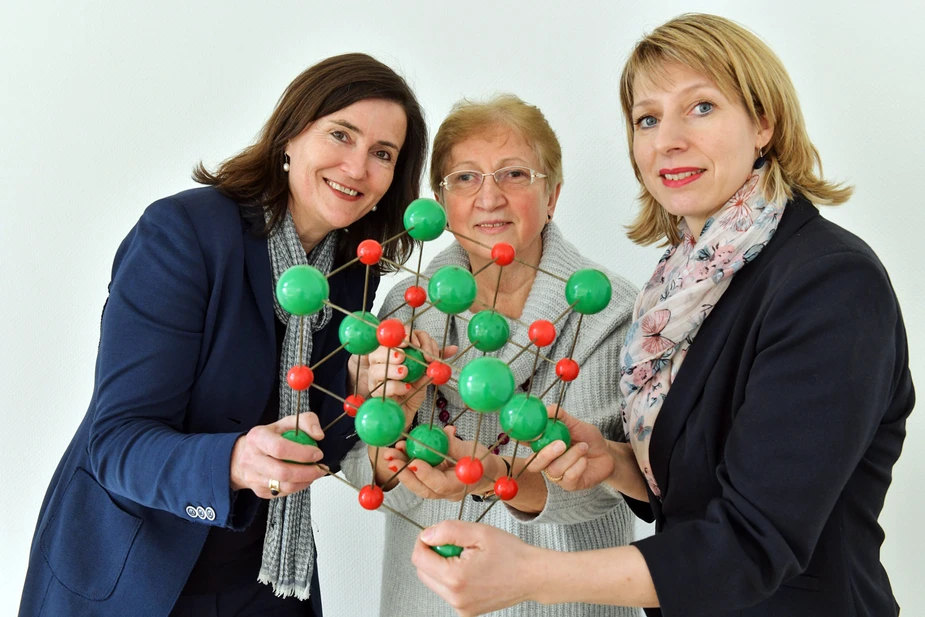Do women network differently?
On role models and the guide to self-marketing
There it is again that much maligned cliché! Even here in Adlershof. There are not enough women in STEM university courses, even less female professors in university departments and hardly any women among the company’s senior executives on the site. But why is that? Do women network differently? Also: where can women get involved in Adlershof?
Katrin Rautter, network coordinator at LaNA, knows: “Male networking is focused solely on the job, while women tend to blend their private with their professional lives. This has much to do with childcare. They also tend to get bogged down in details and lose sight of what is really important. Furthermore, many are unaware of the benefits of well-functioning networks.” Networking is extremely important for professional advancement, because when it comes to being invited to an interview, the applicants who have better contacts also have a clear advantage.
A host of professional women networks have been founded in the Science Park Adlershof to support girls and women at both school, university and beyond. One of them is the Ladies Network Adlershof (LaNA). Their events feature successful women from politics, science and business, who talk about their career, what and who helped them, and which pitfalls should be avoided on the way. “We host an annual breakfast event that takes place on Women’s Day, 8th March, we consult young women at the Long Night of the Sciences, we host the Ladies Tea Time, and organise seminars and book events on female careers,” says Rautter. Specialised workshops provide coaching on issues such as soft skills and self-marketing for women. This is indeed necessary: “When men read about a job vacancy that has a 70% match with their skillset, they say ‘I’m the one for the job’. A woman in the same situation will say ‘Oh, I’ll probably need additional training’,” says Katrin Rautter.
Nowadays, the concept of a “successful career” is not as dominant as it used to be. It has become more important for women to follow their passion and do what they are good at. A mere 19% of executive positions in Adlershof are held by women. “There is a lot of room for improvement,” says Rautter. “Networking among women who work on the site” is important as well as finding suitable role models to take pressure off women and to embolden them. Women can benefit each other. Rautter and her team have now started hosting a lunchtime get-together, where the equality and women’s officer is available to meet up or network on every first Thursday of the month at noon.
The WiNS Adlershof network, short for “Women in Natural Sciences”, comes in at an earlier stage. Starting last summer, their mission is to familiarise female PhD students in the natural sciences with networking. Petra Metz is the head of WiNS at the Humboldt-Universität zu Berlin. “Our aim is to make women more visible, to support them with issues that are relevant to their careers and to help them connect with others. Ultimately, our goal is to increase the share of women in top-level faculty and executive positions by 30 percent,” she says.
This is an ambitious goal considering the number is 11 percent in computer science and chemistry and only 10 percent in physics. Metz is the liaison between the university, companies and research facilities, organising workshops, a mentoring programme and networking events. Those events often feature post-docs who talk about their employers and their academic and professional trajectory.
Metz: “Of course, our mentors can also be men. After all, it is crucial to know how they view the rules of the game.”
WiNS is the follow-up to a project called FiNCA. FiNCA stands for early promotion of girls and young women. The project aims at inspiring girls at school to study a natural science by hosting summer courses and supports female students at university. “Our project in Adlershof follows a new approach, including that to family support, because it includes women from every social class or age. It’s about the future of women in the natural sciences,” says Márta Gutsche, the initiator and long-standing programme manager.
Later, WiNS steps in to motivate female natural scientists to find the confidence for executive positions. Many women in the natural sciences felt well looked after, but they missed interdisciplinary exchange. Metz: “Networking events are among our basic modules, which also include workshops and coaching on soft skills such as time management, presentation and vocal training, leadership skills, personality development and balancing family and career.” However, many positions are short-term, temporary jobs. Especially in the natural sciences, it would help to have a long-term perspective. Since not every female natural scientist can become a professor, WiNS also highlights paths leading into the private sector.
Metz concludes: “It is our goal to develop diverse personalities.”
By Kathrin Reisinger for Adlershof Journal
